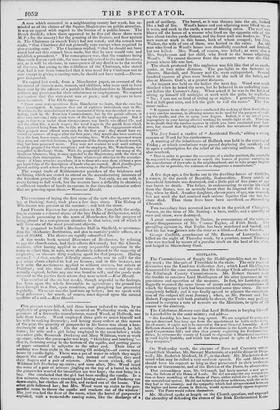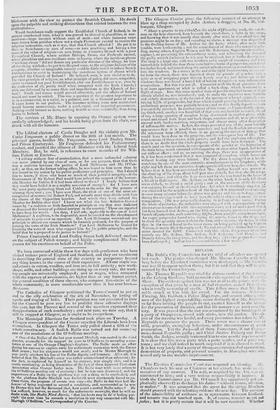On Wednesday week, the electors of Ross and Cromarty enter-
tained their Member, Mr. Stewart Mackenzie, at a public dinner at Ding- wall ; Mr. Roderick Macleod, M. P., in the chair. Mr. Mackeezie deli- vered what may be called a very moderate speech. He said Ministers should have his support as long as they persevered in their modente system of Government, and of the Reform of the Peers, he observed— That extraordinary man, Mr. O'Connell, had lately mooted a new qm•s- tion, the Reform of the House of Lords. He dhl not consider any reorganizt- tion or fancy modelling of the House of Peers, either called-for or safe, tinier our monarchical system. lie did not believe that those noblemen, with the stake they had in the country, aud the sympathy which had always existed. between the higher and lower classes in Britain, would systematically oppose improve- ment. The Peers would reform themselves.
Mr. Macleod spoke at length on the Church question, and exposed the absurdity of defending the abuses of the Irish Ecclesiastical Esta-
blishment with the view to protect the Scottish Church. He dwelt upon the palpable and striking distinctions that existed between the two institutions— Would Scotehmen really support the Established Church of Ireland, in its present unreformed state, when it was proved to abound in pluralities, in non- residence—large incomes without cure of souls—and where immense sums were drawn from parishes where not a single Protestant existed to receive the religious instruction, such as it was, that this Church afforded ? He put it to theno as Scotehmen—as men of sense—as men practising and having a due sense of the value of religion—as men living in a country blessed with a pure Evangelical Church, where neither Bishops, Deans, nor Prebends existed, whew pluralities and non-residence were ur known, where the invidious pbrase " working clergy" did not denote any particular division of the clergy, for here all the clergy worked,—he put it to the good: sense to the religious feelings of the company, whether an imaginable interest cc uld be fairly stated to induce Scotch Presbyterians to assist in maintaining the Inonstrous system of abuses which pervaded the Church of Ireland ? lie believed, even, It was sinful so to do. On what principle of religion, on what principle of policy, did sonic, misguided, strive to connect our pure Establishment, (for our Establishment was, even by the confession of all, purity itself when compared with the Irish Church,) with one deformed by so many blots and imperfections as the Church of lie- laud? Truth and reason would prevail ultimately, and the affairs of Ireland would and must be settled. This was a question of the greatest importance to ue in a commercial, in a social, in a political, and in a financial point of view. It came home to our pockets. The immense militaly force now maintained would become unnecessary, under a good, equal, and impartial government. Nothing could interest us more, nothing benefit us more essentially, than doing justice to Ireland.
The services of Mr. Hume in exposing the Orange system were cordially acknowledged; and his health being given from the chair, was drunk with all the honours.



























 Previous page
Previous page